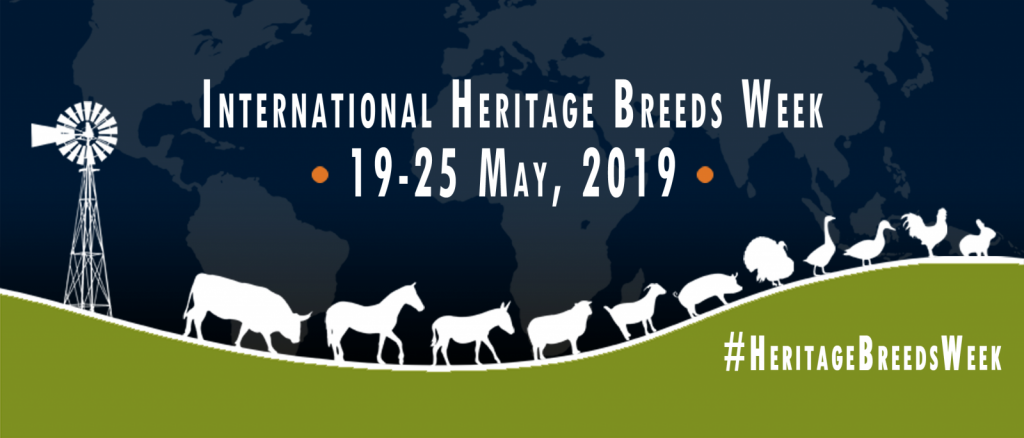
FOR IMMEDIATE RELEASE
Editor’s Note: Images available for download at: bit.ly/HeritageBreeds
Interviews available upon request.
New Reports: Loss of Breeds Threatens Food Supply, Ability to Adapt
Week of awareness aims to call attention to threats to biodiversity
PITTSBORO, NC, USA [16 May, 2019] – The story of humanity is intimately connected to the story of livestock. The animals that provide much of our food, clothing, work, and so many other resources were domesticated before recorded history. More than 10,000 years ago, humans reached out to nature to tame wild species, incorporating them into our lives and cultures. Some of those original wild species have been lost to history, but their genetics live on in their domesticated progeny. Today’s farm animals and their ancestors have made possible many of the advances the modern world now takes for granted. Not only have we inherited a diverse assortment of livestock species, but we have been given an expertly curated collection of breeds that is skillfully tailored to fit the needs of local communities from all corners of the globe. These heritage breeds of farm animals and the genetics they possess are not only living time capsules from our past; they represent the key to our future as we are forced to adapt to a world that is changing at a rate not seen in previous generations. According to a report released last week, the future of animal agriculture is in jeopardy.
An advance summary of a massive new assessment released last week by the Intergovernmental Science-Policy Platform on Biodiversity and Ecosystem Services (IPBES) announced sobering statistics on the state of global animal agriculture. According to the findings, by 2016, 559, or over 9% of domesticated breeds of mammals used for food and agriculture had become extinct and at least 1,000 more are threatened with extinction.¹ The State of the World’s Biodiversity for Food and Agriculture report, released earlier this year from the Food and Agriculture Organization of the United Nations, tells us that at least 26% of the world’s local breeds of livestock are currently at risk and only 7% of breeds worldwide are secure. The status of the remaining 67% of breeds is unknown due to a lack of data and established conservation programs. ² Most of the extinctions and population declines in our farm animals occurred after the year 1900.
In more developed areas of the world, agriculture has shifted to using a small handful of highly uniform and productive breeds designed to maximize output of agricultural products. Many once-popular breeds representing the majority of genetic diversity within species, have now become rare. In the developing world and in many indigenous communities, some farmers see the successful production rates of modern breeds as a reason to abandon their locally adapted, but less productive animals, in favor of importing breeds from other countries. While in some cases these farmers may see short-term increases in production, they may be abandoning the very genetics that will be crucial to their ability to continue to farm in their regions. These genetics may also be important to other geographic areas as their climates and the needs of their communities change. If lost, we may not have the ability to adapt animal agriculture for our future needs.
As concerning as this situation may seem, the concept of endangered farm animals is not as familiar to many people as that of our endangered wildlife species. To help fill this gap in knowledge, “International Heritage Breeds Week,” which begins on Sunday, will be hosted by conservation organizations from around the world, coming together to raise awareness of the increasing threat to biodiversity in animal agriculture. Over the course of the week, these organizations, farmers, and the public will share their stories of how heritage breeds have contributed to their lives, environments, and local economies.
Heritage breeds, with their wide variety of traits carefully crafted by generations of farmer-scientists and shaped by the natural world, have the ability to adapt and continue the journey they have taken with humans for millennia.
To learn more about International Heritage Breeds Week, how you can get involved, and where to locate Heritage breed products in your local area, visit www.HeritageBreedsWeek.org and follow #HeritageBreedsWeek on social media.
###
Sources:
¹ Intergovernmental Science-Policy Platform on Biodiversity and Ecosystem Services (2019). Summary for Policymakers of the Global Assessment Report on Biodiversity and Ecosystem Services.
² Source: Food and Agriculture Organization of the United Nations. (2019). The State of the World’s Biodiversity for Food and Agriculture.



